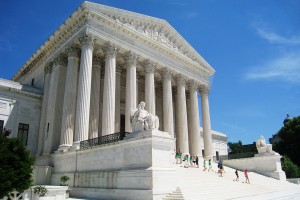Supreme Court of the United States: Alito, J., while explaining whether Section 1806(f) of FISA would apply to a case when dealt with charging a specific individual or to challenging methods of surveillance of FBI remarked that,
Section 1806(f) is most likely to come into play when the Government seeks to use FISA evidence in a judicial or administrative proceeding, and the Government will obviously not invoke the state secrets privilege to block disclosure of information that it wishes to use.
In the present matter, Supreme Court considered the relationship between the longstanding “state secrets” privilege and a provision of the Foreign Intelligence Surveillance Act of 1978 (FISA) which provides a procedure under which a trial-level court or other authority may consider the legality of electronic surveillance conducted under FISA and may thereafter order specified forms of relief.
The above-stated case was brought in Federal Court by three Muslim residents of Southern California who alleged that the Federal Bureau of Investigation illegally surveilled them and others under FISA because of their religion.
The government had invoked the state secrets privilege and asked the District Court to dismiss most of the respondents’ claims because the disclosure of counter-intelligence information that was vital to an evaluation of those claims would threaten national-security interests.
This Court repeatedly recognized “a government privilege against court-ordered disclosure of state and military secrets”.
Crux
Whether FISA affects the availability or scope of that long-established privilege?
Background
Respondents were members of Muslim communities in southern California who claimed that the Federal Bureau of Investigation illegally surveilled them because of their religion.
Further, it was alleged that the FBI directed a confidential informant to “gather information on Muslims in an indiscriminate manner”. The said informant had infiltrated a Muslim community and gathered “hundreds of phone numbers and thousands of email addresses of Muslims” “hundreds of hours of video recordings” made inside mosques, homes, and other private locations; and “thousands of hours of audio recording of conversations” and of “public discussion groups, classes, and lectures.”
In addition to the above, respondents alleged that the surveillance operation ended when the informant began asking members of the community about violent jihad, and some of those individuals reported the informant to the FBI and his local police.
In the present matter, much of the argumentation in this Court concerned the correct interpretation of §1806(f).
Respondents did not dispute that §1806(f) applies when the Government seeks to introduce evidence and a private party seeks to prevent such use, but they argued that §1806(f) is also sometimes triggered when “a civil litigant seeks to obtain such secret information.”
Analysis and Conclusion
Court stated that regardless of whether the state secrets privilege is rooted only in the common law (as respondents argue) or also in the Constitution (as the Government argues), the privilege should not be held to have been abrogated or limited unless Congress has at least used clear statutory language.
Bench opined that it seemed clear that the state secrets privilege would not be invoked in the great majority of cases in which §1806(f) is triggered.
Section 1806(f ) is most likely to come into play when the Government seeks to use FISA evidence in a judicial or administrative proceeding, and the Government will obviously not invoke the state secrets privilege to block disclosure of information that it wishes to use.
Under §1806(f ), the central question is the lawfulness of surveillance. Courts are instructed to determine “whether the surveillance of the aggrieved person was lawfully authorized and conducted.”
Supreme Court expressed when the state secrets privilege is asserted, the central question is not whether the evidence in question was lawfully obtained but whether its disclosure would harm national security interests.
“We have never suggested that an assertion of the state secrets privilege can be defeated by showing that the evidence was unlawfully obtained.”
Elaborating more on Section 1806(f), Court explained that, the procedures used to evaluate assertions of the state secrets privilege may also, in some circumstances, be more protective of information than the procedures prescribed by §1806(f). Subsection (f) allows “review in camera and ex parte” of materials that are “necessary to determine” whether the surveillance was lawful. Nothing in that sub-section expressly provides that the Government may shield highly classified information from review by the judge if the information is “necessary” to the determination of the legality of the surveillance.
Therefore, Court concluded that Congress did not eliminate, curtail or modify the state secrets privilege when it enacted Section 1806(f).
Significantly, the Bench addressed whether §1806(f) displaces the state secrets privilege. It was concluded that the said section does not have the effect under either party’s interpretation of the statute, nor does the Court decide whether the Government’s evidence was privileged or whether the District Court was correct to dismiss respondents’ claims o the pleadings.
Lastly, the Bench held that the case has been remanded for further proceedings. [Federal Bureau of Investigation v. Fazaga, 2022 SCC OnLine US SC 1, decided on 4-3-2022]

